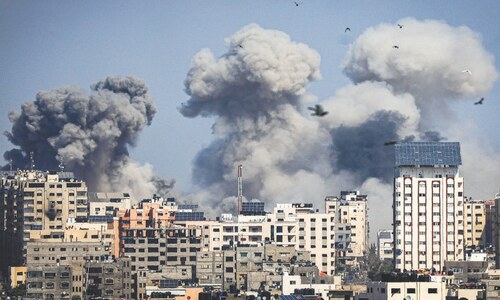In the wake of relentless aerial attacks, Israel has escalated its ground offensive, pushing the Palestinian death toll beyond 8,000. The United Nations has issued a dire warning, stating that civil order is “starting to break down” in this besieged territory. Despite mounting calls for a humanitarian ceasefire and international outrage, Israel persists in its military campaign, which was triggered by Hamas over three weeks ago. Gaza’s health ministry reports that more than 8,000 people, predominantly civilians, with half being children, have lost their lives to the unrelenting Israeli bombardment. As Israel enters “phase two” of its invasion, tensions remain high in the region.
Ground Offensive and Escalating Conflict
With boots on the ground, Israel’s military campaign in Gaza has entered a new phase, bringing further devastation to the region. The Israeli army’s decision to intensify its ground operation comes after days of relentless bombardment from the air. The Palestinian death toll has surged, with more than 8,000 casualties, mainly civilians, including a significant number of children. In response to Hamas’s initial raid, Israel shows no signs of backing down, despite international calls for a humanitarian ceasefire. The conflict continues to escalate, and there are growing concerns about the toll it is taking on innocent civilians in Gaza.
UN’s Dire Warning and Humanitarian Crisis
United Nations Secretary-General Antonio Guterres has issued a stark warning, emphasizing that the situation in Gaza is “growing more desperate by the hour.” As casualties rise and essential supplies of food, water, medicine, and shelter dwindle, the urgency of the humanitarian crisis cannot be overstated. The UN chief reiterates the call for a ceasefire to end the ongoing “nightmare.” Meanwhile, the International Committee of the Red Cross has expressed shock at the “intolerable level of human suffering” in Gaza, urging all parties involved to de-escalate and calling it a “catastrophic failure” that the world cannot ignore.
Regional Implications and International Response
The intensification of ground operations in Gaza has raised concerns about potential regional involvement in the conflict. Israel’s other enemies, including Iran-backed forces in Lebanon, Syria, Iraq, and Yemen, could enter the fray. Skirmishes on the Israeli-Lebanese border with Hezbollah, a Hamas ally backed by Iran, have further fueled these concerns, potentially opening a new front in the already volatile region. Iran’s President Ebrahim Raisi has warned that Israel’s actions have crossed “red lines,” suggesting the possibility of wider regional involvement.
While the United States has cautioned regional forces against getting involved in the conflict, it has also been pressuring Israel with tough questions about the ongoing war. President Joe Biden has emphasized the need for increased humanitarian aid to Gaza and has discussed this with Israeli Prime Minister Benjamin Netanyahu. The White House has underscored its stance against the killing of innocent people, irrespective of their nationality, and is actively engaging with Israel on critical issues such as humanitarian aid and distinguishing between combatants and civilians.
World leaders have also amplified their calls for urgently needed humanitarian assistance to reach the war-torn Gaza Strip. British Prime Minister Rishi Sunak and French President Emmanuel Macron have highlighted the importance of delivering swift humanitarian support to the Palestinian territory as the crisis deepens.















